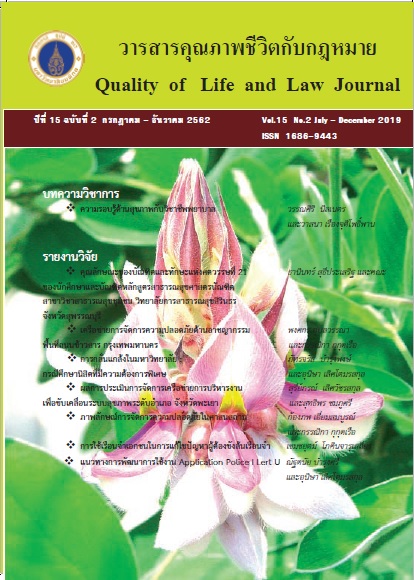The Desirable Characteristics and The Twenty-First-Century Skills for Students and Graduates from the Bachelor of Community Public Health Program, the Department of Community Public Health, Sirindhorn College of Public Health Suphanburi
Main Article Content
Abstract
This descriptive research aimed at exploring and comparing the attributes among both graduates and students with the six learning outcomes and the twenty-first-century skills from the Bachelor of Public Health Program, the Department of Community Public Health, Sirindhorn College of Public Health Suphanburi. Data were collected from the total of 127 participants by simple random sampling, including batch one and two graduates, and batch three and four students from the Bachelor of Community Public Health Program. Data analysis were presented as frequency, percentage, standard deviation, minimum and maximum values, and the One-Way ANOVA test.
The results showed that learning outcomes of batch one and two graduates from each dimension and overall were at high level, while students in batch three and four presented the medium level. For the twenty-first-century skills of graduates from batch one and two, findings indicated that each dimension and overall skills were at high level, while students from batch three and four showed the overall score at the medium level. Interestingly, all four batches exhibited the lowest level in writing and reading skills. When comparing the graduates from both batch one and two with batch three and four students, findings showed that the average learning outcomes and the twenty-first-century skills were statistically significant difference at the high level with the p-value of 0.001. Results also suggested that graduates from previous batches had higher learning outcomes and twenty-first-century skills than junior students in later batches.
This is therefore advisable that the agglomeration of diverse learning activities should be manipulated so as to shape students’ experiences from the real workplace and an opportunity to practice their skills inside and outside the classroom while studying at the college.
Article Details
- บทความหรือข้อคิดเห็นใดๆ ในวารสารคุณภาพชีวิตกับกฎหมายเป็
- กองบรรณาธิการไม่สงวนสิทธิ์
References
และทุติยรัตน์ รื่นเริง. (2558). ทักษะแห่งศตวรรษที่ 21 ของนักศึกษาพยาบาล ในวิทยาลัยพยาบาล
บรมราชชนนีชลบุรี. วารสารพยาบาลกระทรวงสาธารณสุข, 25 (2), 178-193.
เจตนิพัทธ์ บุณยสวัสดิ์, วิไลภรณ์ สุทธา, พจนีย์ บุญนา, สุนีย์ สหัสโพธิ์, อภิญญา มานะโรจน์ และ
เชาวลิต อุปฐาก. คุณลักษณะบัณฑิตที่พึงประสงค์ตามกรอบมาตรฐานคุณวุฒิระดับอุดมศึกษา
แห่งชาติ ของสาขาวิชาอาหรและโภชนาการ. คณะเทคโนโลยีคหกรรมศาสตร์. กรุงเทพฯ:
มหาวิทยาลัยเทคโนโลยีราชมงคลพระนคร; 2554.
ชูศรี วงศ์รัตนะ. (2550). เทคนิคการใช้สถิติเพื่อการวิจัย. พิมพ์ครั้งที่ 10. นนทบุรี: บริษัทไทยเนรมิตกิจ
อินเตอร์โปรแกรสชิพ จำกัด.
ธีรวุฒิ เอกะกุล. (2543). ระเบียบวิธีวิจัยทางพฤติกรรมศาสตร์และสังคมศาสตร์. พิมพ์ครั้งที่ 5.
อุบลราชธานี: คณะครุศาสตร์ สถาบันราชภัฏอุบลราชธานี.
รุ่งนภา จันทรา, เพ็ญศรี ทองเพชร และอติญาณ์ ศรเกษตริน. (2559). ปัจจัยที่มีความสัมพันธ์กับ
คุณลักษณะของบัณฑิตที่พึงประสงค์ตามกรอบมาตรฐานคุณวุฒิระดับอุดมศึกษาแห่งชาติของ
นักศึกษาพยาบาล วิทยาลัยพยาบาลบรมราชชนนี สุราษฎร์ธานี. วารสารการพยาบาลและ
การศึกษา, 9 (4), 90-101.
รุ่งนภา จันทรา และอติญาณ์ ศรเกษตริน. (2560). ทักษะการเรียนรู้ศตวรรษที่ 21 ของนักศึกษาพยาบาล
วิทยาลัยพยาบาลบรมราชชนนี สุราษฎร์ธานี. วารสารเครือข่ายวิทยาลัยพยาบาลและการ
สาธารณสุขภาคใต้, 4 (1), 180-190.
ศิราณีย์ อินธรหนองไผ่ และจุฑามาศ คชโคตร. (2560). ผลการเรียนรู้ตามกรอบมาตรฐานคุณวุฒิ
ระดับอุดมศึกษาแห่งชาติ ในรายวิชาปฏิบัติการพยาบาลชุมชน หลักสูตรพยาบาลศาสตร
บัณฑิต. วารสารพยาบาลตำรวจ, 9 (2), 104-114.
สำนักงานคณะกรรมการการอุดมศึกษา ประเทศไทย. (2557).คู่มือการประกันคุณภาพการศึกษาภายใน
ระดับอุดมศึกษา ฉบับปีการศึกษา 2557. กรุงเทพมหานคร: สำนักมาตรฐานและอุดมศึกษา.
อ้อมใจ พลกายา และอัจฉราพรรณ วงษ์น้อย. (2561). ความพึงพอใจในงานและทักษะแห่งศตวรรษที่ 21
ของบัณฑิต วิทยาลัยพยาบาลบรมราชชนนี จักรีรัช. วารสารการศึกษาและการพัฒนามนุษย์,
2 (2), 69-78.
Trilling B, Fadel C. (2009). Learning and innovation skills. 21st century skills learning for
life in your times. San Francisco: Jossey-Bass.


